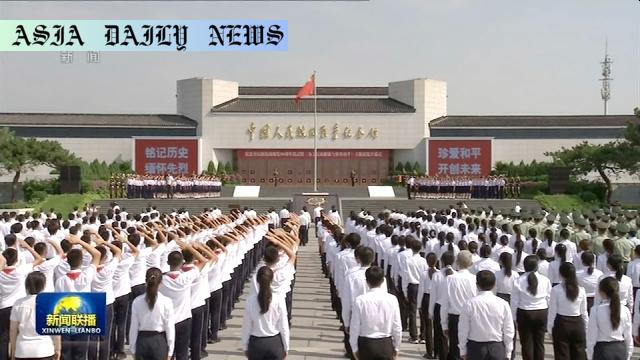Marco Polo Bridge Incident: Ceremony in Beijing Honors National Liberation & Peace After 88 Years
China marks the 88th anniversary of the Marco Polo Bridge Incident, pivotal in triggering the anti-Japanese war.
A patriotic exhibition, titled ‘For National Liberation and World Peace,’ was inaugurated in Beijing.
The Japanese Embassy advises its citizens to avoid attention due to sensitivities surrounding the anniversary.

The Historical Context of the Marco Polo Bridge Incident
The Marco Polo Bridge Incident, also known as the Lugou Bridge Incident, marked a significant turning point in modern Chinese history. On July 7, 1937, a skirmish broke out between Chinese forces and the Imperial Japanese Army at a historical location near Beijing. This confrontation escalated into a full-scale war, ultimately initiating the Second Sino-Japanese War (1937–1945). The Marco Polo Bridge, with its ancient stone arches and cultural significance, became a militarized zone, symbolizing the resistance and struggle of the Chinese people against foreign aggression.
What started as a seemingly minor clash over missing Japanese soldiers led to open hostilities between Japan and China, showcasing the fragile geopolitical atmosphere at the time in East Asia. Following the incident, full-blown conflict spread across Northern China, setting the stage for World War II in the Pacific theater. The incident remains a crucial reminder of China’s historical resilience and the heavy toll of war on the country’s people and infrastructure.
Beijing’s Commemoration in 2023: Honoring Sacrifices
On July 7, 2023, the Chinese Communist Party observed the 88th anniversary of the incident through various ceremonies and exhibitions. A significant event held at the Museum of the War of Chinese People’s Resistance Against Japanese Aggression in suburban Beijing brought together high-ranking officials and citizens to reflect on the past. Cai Qi, a member of the Communist Party Political Bureau’s Standing Committee, attended the ceremony and referenced the importance of reflecting upon the sacrifices made for China’s independence.
The event included the inauguration of the exhibition themed “For National Liberation and World Peace.” The exhibition was meticulously prepared since the autumn of 2022 and emphasizes the patriotism and revolutionary struggles that were undertaken by countless individuals to safeguard their homeland. Through multimedia displays, relics, and artworks, the museum highlights the war’s societal and historical impact while exploring the perseverance and unity of the Chinese people in the face of adversity.
A Broader Reflection: Lessons and Global Peace
The commemoration reflects the Communist Party’s commitment to ensuring historical moments like the Marco Polo Bridge Incident are not forgotten. The incident serves as a somber reminder of the devastating effects of global conflict. China’s decision to honor the victims and soldiers with an extended exhibition reiterates the importance of educating and inspiring future generations to understand the value of peace and the peril of aggression.
In broader terms, the campaign aligns with China’s designation of 2025 as the “80th anniversary of the victory in the Chinese people’s war of resistance against Japanese aggression.” Initiatives like this serve to strengthen national unity, promote patriotism, and reinforce identity, as China’s narrative on historical events gains a prominent position in shaping its future goals.
Diplomatic Sensitivities and Global Ramifications
The anniversary doesn’t come without diplomatic ramifications. While China focuses on national remembrance, the Japanese Embassy in Beijing issued guidance to its citizens, urging them to avoid speaking Japanese or wearing conspicuous attire on the anniversary day. This highlights the underlying sensitivities and unresolved tensions that linger between the two nations regarding historical narratives and wartime events.
Despite modern geopolitical complexities, lessons from the Marco Polo Bridge Incident remain ever-relevant. The pursuit of peace, mutual understanding, and respect for past sacrifices remains crucial for fostering stronger relations and averting confrontation in the Asia-Pacific region. By addressing its historical wounds, China underscores the necessity of remembering history while framing a vision for progress and stability in the decades to come.



Commentary
Reflecting on China’s Observance of the Marco Polo Bridge Incident
China’s commemoration of the Marco Polo Bridge Incident’s 88th anniversary is not only a historical reflection but also a demonstration of how history continues to shape modern geopolitics. The Chinese Communist Party has strategically used this occasion to underscore themes of patriotism, resilience, and the collective struggle of the Chinese people against external threats. For those unfamiliar with the significance of the Lugou Bridge, it serves as a poignant reminder that even minor conflicts can escalate into global-scale disasters.
The Relevance of Historical Remembrance
The importance of memorializing events like the Marco Polo Bridge Incident lies in their ability to educate future generations about the high cost of conflict. This year’s exhibition in Beijing captures this sentiment well, offering a perspective on perseverance and the value of unity. By incorporating modern elements like multimedia displays alongside historical relics, the organizers have successfully created a platform for informed reflection and education. Events such as this underline how history can empower confidence and identity for a nation striving to balance its internal goals with external challenges.
Diplomacy and the Challenge of Historical Reconciliation
What stands out about this year’s commemoration is the complex relationship it highlights between historical reflection and modern diplomacy. The guidance issued by Japan’s embassy in Beijing speaks to the remaining sensitivities between the two nations. These unresolved tensions serve as a timely reminder for global communities about the importance of reconciliation and honest dialogue. As relations in the Asia-Pacific region evolve, revisiting historical events with fairness and empathy will be critical for ensuring enduring peace.
A Lesson in Unity and Peace
Overall, the 88th anniversary of the Marco Polo Bridge Incident offers powerful lessons not just to those within China but also to the global community. By reflecting on the atrocities of the past and prioritizing education on revolutionary traditions, nations can foster greater awareness for the cost of peace. It is encouraging to see China use this somber occasion to emphasize both historical remembrance and aspirations of world peace. Though tied to a painful chapter in history, the commemoration serves as a beacon for unity, resilience, and forward-looking progress.